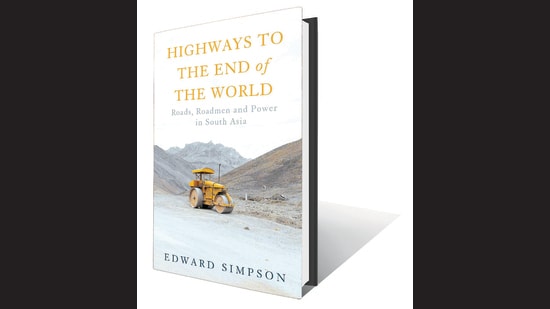Citizens now believe that road building is a harbinger of change, and nothing suits a politician better than to make this a reality. In recent times, road-building has been naturalised to the point of common sense, integrating it into a system of governance as part of the development imperative that promotes the politics of power. Modern roads are paved versions of age old pathways, which are being promoted and sold to people like any other commodity. They have turned out to be an enchanted form of infrastructure that’s now so celebrated that there’s no room for asking dissenting questions.

351pp, ₹3052; Hurst
Exploring the political economy of road building, social anthropologist Edward Simpson asks uncomfortable questions on the subject to the roadmen of South Asia: Why are so many roads being built in an era of human-induced climate change? What do the roadmen think about their work and the future of the planet? And how did these become central to the region’s nationalist and developmental agenda in the first place? The answers aren’t easy to come by, but it is certain that road building is a sure way to win currency and power.
Roads do transform ways of life, and are, therefore, a self reproducing system that demands constant growth and expansion. Consequently, roads have become important sites for inauguration ceremonies and campaign trails. Combining the politics and poetics of road infrastructure, Simpson follows the money to provide a geopolitical narrative that puts road building as a never ending future. Such is the desire to stay connected that the uncomfortable proclivity of roads to impact climate change holds little relevance. Road building from the perspective of ideas, discourse, and rhetoric presents an interesting but controversial story.
Highways to the End of the World digs into the history of road building and looks at how it passed through technological phases and became part of ideological projects. This ethnographic account of the road as a way of telling a story that cuts a route through landscapes, lives and times makes it particularly arresting. “I was interested in learning what people say when they look at roads,” quips Simpson, “as roads raise fundamental questions about the world and the way we relate to one another.” Gandhi had described roads as instruments of oppression, while for Nehru roads evoked modern amenities and methods. However, over the years, roads have become comparative national identity projects in both India and Pakistan, giving birth to political strategies.
All this is illustrative of the broader processes and thought politics that promote a form of market that positions roads as a commodity. Isn’t the road a part of the economy of the elite? Haven’t levels of corruption in road building been something of a national joke? Despite John F Kennedy’s claim that “America is rich because American roads are good”, road-building in the US is not without its share of criticism. Picking up on his longer-term critique of planned obsolesce in his book, A Nation of Strangers, journalist Vance Packard stated that “the mobility enabled by roads and cars is the root of social isolation and loneliness.” Eventually, roads are part of a Faustian bargain, the sacrifice of everything to satisfy desire.

Author Edward Simpson (Courtesy Lancaster University)
Simpson’s multi-layered assessment of roads helps realise that road building is more than just the cost of land, working manpower, and inert materials. The narrative on roads asserts that roads are the only way to address gross inequality and support common responsibility for the future. Travelling across highways in the subcontinent, Simpson found much to the contrary with the highways facilitating drug trafficking, encouraging sex trade, and connecting land mafia. Not without reason had Gandhi found that the road and its machines enslave people, not only by exploiting their labour but also by binding them to particular forms of consumption. One might wonder if roads actually contribute to the long-term betterment of the world.
Highways to the End of the World provides a panoramic but contentious view on road building. An important anthropological study, it examines the history, sociology, economy and ecology of road building. This is an interdisciplinary scrutiny of the process of road building that runs through an unequal world in which scale, friction and speed take the reader along invisible routes ridden with global debt, money laundering, and political conspiracy. It is a must-read especially for those who consider road building a burden on the economy and ecology.
Sudhirendar Sharma is an independent writer, researcher and academic.
Read more news like this on HindustanTimes.com
News Related-
Anurag Kashyap unveils teaser of ‘Kastoori’
-
Shehar Lakhot: Meet The Intriguing Characters Of The Upcoming Noir Crime Drama
-
Watch: 'My name is VVS Laxman...': When Ishan Kishan gave wrong answers to right questions
-
Tennis-Sabalenka, Rybakina to open new season in Brisbane
-
Sikandar Raza Makes History For Zimbabwe With Hattrick A Day After Punjab Kings Retain Him- WATCH
-
Delayed Barapullah work yet to begin despite land transfer
-
Army called in to help in tunnel rescue operation
-
FIR against Redbird aviation school for non-cooperation, obstructing DGCA officials in probe
-
IPL 2024 Auction: Why Gujarat Titans allowed Hardik Pandya to join Mumbai Indians? GT explain
-
From puff sleeves to sustainable designs: Top 5 bridal fashion trends redefining elegance and style for brides-to-be
-
The Judge behind China's financial reckoning
-
Arshdeep Singh & Axar Patel Out, Avesh Khan & Washington Sundar IN? India's Likely Playing XI For 3rd T20I
-
Horoscope Today, November 28, 2023: Check here Astrological prediction for all zodiac signs
-
'Gurdwaras are...': US Sikh body on Indian envoy's heckling by Khalistani backers
